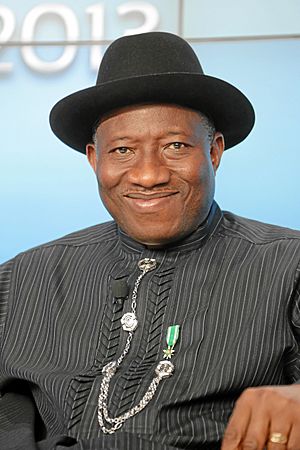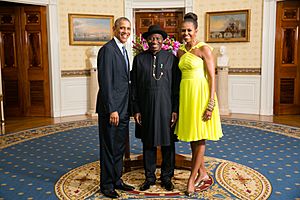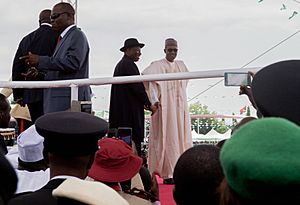Goodluck Jonathan facts for kids
Quick facts for kids
Goodluck Jonathan
GCFR GCON
|
|
|---|---|

Jonathan at the World Economic Forum in 2013
|
|
| 14th President of Nigeria | |
| In office 6 May 2010 – 29 May 2015 Acting: 9 February 2010 – 6 May 2010 |
|
| Vice President | Namadi Sambo |
| Preceded by | Umaru Yar'Adua |
| Succeeded by | Muhammadu Buhari |
| 12th Vice President of Nigeria | |
| In office 29 May 2007 – 6 May 2010 |
|
| President | Umaru Yar'Adua |
| Preceded by | Atiku Abubakar |
| Succeeded by | Namadi Sambo |
| 6th Governor of Bayelsa | |
| In office 9 December 2005 – 29 May 2007 |
|
| Preceded by | Diepreye Alamieyeseigha |
| Succeeded by | Timipre Sylva |
| Deputy Governor of Bayelsa | |
| In office 29 May 1999 – 9 December 2005 |
|
| Governor | Diepreye Alamieyeseigha |
| Personal details | |
| Born |
Goodluck Ebele Azikiwe Jonathan
20 November 1957 Ogbia, Eastern Region, British Nigeria (now Ogbia, Bayelsa State, Nigeria) |
| Political party | Peoples Democratic Party |
| Spouse | Patience Jonathan |
| Children | 2 |
| Alma mater | University of Port Harcourt (BS, MS, PhD) |
| Occupation | Politician |
Goodluck Ebele Azikiwe Jonathan (born 20 November 1957) is a Nigerian politician who was the president of Nigeria from 2010 to 2015. He is known for being the first president in Nigerian history to accept defeat in an election. This allowed for a peaceful transition of power to the next leader, Muhammadu Buhari.
Before becoming president, Jonathan served as the vice president of Nigeria from 2007 to 2010. He was also the governor of the oil-rich Bayelsa State from 2005 to 2007, and the deputy governor from 1999 to 2005.
His decision to accept the 2015 election results was a major moment for Nigeria. It helped show that power could be transferred peacefully in Africa's largest democracy.
Contents
Early Life and Schooling
Goodluck Jonathan was born on November 20, 1957, in Ogbia, Bayelsa State. He came from a Christian Ijaw family who were canoe makers. His father, Lawrence, made canoes, and his mother, Eunice, was a farmer.
Jonathan earned three degrees from the University of Port Harcourt: a bachelor's degree in zoology, a master's degree in hydrobiology (the study of life in water), and a doctorate in zoology. He also worked as a teacher at a college from 1983 to 1993.
Beginning of His Political Career
Before entering politics in 1998, Jonathan worked as an education inspector, a lecturer, and an environmental-protection officer. His political career started in the late 1990s with the Peoples Democratic Party (PDP).
In 1999, Diepreye Alamieyeseigha was elected governor of Bayelsa State, and he chose Jonathan to be his deputy governor. They were re-elected in 2003. Jonathan was known for being a loyal and hardworking deputy governor.
On December 9, 2005, Governor Alamieyeseigha was removed from office. As the deputy governor, Jonathan was then sworn in as the new governor of Bayelsa State, following the state's rules.
Vice Presidency (2007–2010)
As Vice President, Jonathan was a member of important government groups like the National Security Council and the Federal Executive Council.
When President Umaru Musa Yar'Adua became very ill and had to travel to Saudi Arabia for medical treatment in 2009, there was a period of uncertainty in Nigeria. To solve this, the Senate of Nigeria made Jonathan the Acting President on February 9, 2010.
After President Yar'Adua passed away on May 5, 2010, Jonathan was officially sworn in as the President of Nigeria the next day. He then chose Namadi Sambo to be his vice president.
Presidency (2010–2015)
As president, Jonathan promised to focus on a "Transformation Agenda" to improve Nigeria. He wanted to reform the country's power supply and election process.
The Nigerian Economy
Under Jonathan's leadership, Nigeria's economy grew to become the largest in Africa. His government worked on many big projects to improve the country.
New railways were built, like the one connecting Abuja and Kaduna. His government also worked on major roads, including the Lagos-Benin Expressway and the Onitsha-Owerri Highway. A second bridge over the Niger River was also started to help with traffic.
One of his main goals was to fix Nigeria's electricity problems. His administration split the state-owned power company into smaller private companies. The hope was that this would lead to a more stable power supply for the country.
National Events
Fuel Subsidy Protests
In 2012, Jonathan's government decided to end government payments (subsidies) that kept fuel prices low. This caused the price of gasoline to go up, leading to large protests across the country called Occupy Nigeria. After several days of strikes and protests, the government agreed to a compromise, and the price was lowered.
Jonathan explained that the money saved from the subsidy would be used to build roads, bridges, and improve healthcare.
2014 National Conference
In March 2014, President Jonathan started a National Conference. It brought together 492 leaders from all over Nigeria. They met to discuss important issues and find ways to help the country develop.
Ebola Outbreak
In July 2014, the deadly Ebola virus arrived in Nigeria. The government acted quickly to track down anyone who might have been exposed. This fast response helped stop the spread of the disease. By October 2014, the World Health Organization declared that Nigeria was free of Ebola.
Security Challenges
Jonathan's presidency faced major security challenges, especially from the terrorist group Boko Haram in northern Nigeria. The group carried out many attacks, causing a great deal of harm and instability.
In May 2013, the government declared a state of emergency in the states of Borno, Yobe, and Adamawa. The military launched an offensive to fight the group.
One of the most well-known events was the kidnapping of over 200 schoolgirls from the town of Chibok in April 2014. The event caused sadness and anger around the world, with many people demanding the girls' rescue.
In early 2015, Nigeria joined with soldiers from neighboring countries Chad, Cameroon, and Niger. Together, their armies launched a campaign that successfully took back many towns that Boko Haram had captured.
2015 Presidential Election
Jonathan ran for re-election in 2015 against former military leader Muhammadu Buhari. After the votes were counted, Buhari was declared the winner.
On March 31, 2015, Jonathan called Buhari to congratulate him. He accepted the results and made a famous statement: "Nobody's ambition is worth the blood of any Nigerian." His peaceful acceptance of defeat was praised in Nigeria and around the world.
Life After the Presidency
Since leaving office, Goodluck Jonathan has been involved in international peace efforts. In 2019, he was named chairperson of the International Summit Council for Peace.
In July 2020, he was appointed as a special envoy for the Economic Community of West African States (ECOWAS). In this role, he helped lead peace talks during a political crisis in Mali. He has also led teams to observe elections in other African countries, such as Zimbabwe in 2023.
Personal Life
Jonathan is often seen wearing his signature fedora hat, a style popular in the Niger Delta region where he is from.
He and his wife, Patience Jonathan, have two children.
Honours
National Honours
 Nigeria:
Nigeria:
 Grand Commander of the Order of the Federal Republic (GCFR)
Grand Commander of the Order of the Federal Republic (GCFR) Grand Commander of the Order of the Niger (GCON)
Grand Commander of the Order of the Niger (GCON)
Foreign Honours
See also
 In Spanish: Goodluck Jonathan para niños
In Spanish: Goodluck Jonathan para niños
 | James B. Knighten |
 | Azellia White |
 | Willa Brown |



